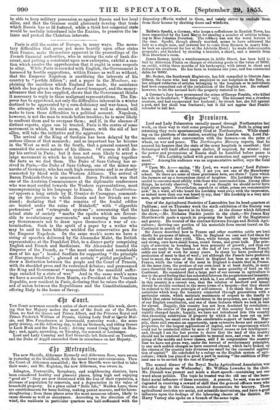Paris is still the centre of Europe, in many ways.
The mone- tary difficulties that press yet more heavily upon other states than France, make themselves apparent in the proceedings of the French financial authorities, who in raising the rate of bank dis- count, and putting a constraint upon new enterprise, exhibit a cau- tion which creates the apprehension that it ought in some respects to allay. While Paris is crowded with English, the Government is harassed by hostile suggestions, within France as well as without, that the Emperor Napoleon is sacrificing the interests of his country to " perfide Albion"; and a paper in the Moniteur, ex- plaining the sacrifices which England has made, the assistance which she has given in the form of naval transport, and the money- advances that she has supplied, shows that the Government thinks it necessary to reply to these malignant representations. The Em- peror has to apprehend, not only the difficulties inherent in a winter destined to be aggravated by a corn-deficiency and war-taxes, but the attempts which his enemies at home as well as abroad will make to turn those difficulties to a political account. Napoleon, however, is not the man to recede before troubles ; he is more likely to confront them and to overpass them; and if, in the absence of distinct reports, signs can be trusted, Paris is the centre of some movement in which, it would seem, France, with the aid of her allies, will take the initiative and the aggressive. The arrival of the King of Sardinia has been delayed by the serious illness of that monarch ; and so important has he become in the West as well as in the South, that a general consent has concealed the serious nature of his illness. Of course it will de- lay his arrival in Paris ; but it does not seem likely to arrest a large movement in which he is interested. We string together the facts as we find them. The Duke of Saxe Coburg has ar- rived in Paris,—the Duke of Saxe Coburg, one of the minor mo- narchs of Germany, who has such high connexions and is so closely connected by blood with the Western Alliance. The arrival of Baron Prokesch-Osten is announced. Baron Prokesch was that one of the Austrian Commissioners at the diplomatic conferences who was most cordial towards the Western representatives, most uncompromising in his language to Russia. In the Constitution- nel appears a long article by M. Granier de Cassagnae, comment- ing on the position to which Russia and her friends are re- dnoed ; declaring that " the remains of the feudal edifice are buried under the ruins of Malakoff," with "oligarchic pretensions" and "retrograde systems"; announcing that the actual state of society "marks the epochs which are favour- able to revolutionary movements," and warning the reaction- ary Governments not to draw upon themselves a war of ex- termination. Such is the spirit of a paper by a writer who may be said to have hitherto wielded the conservative pen for the Emperor Napoleon. In the same week's news we have a string of speeches delivered by Sir Alexander Malet, the British representative at the Frankfort Diet, to a dinner-party comprising English and French and Sardinians. Sir Alexander toasted the Emperor of the French, as "the most eminent and remarkable man of his age "; lauded Sardinia for supporting "the principle of European freedom" ; glanced at certain "pitiful prejudices"; drew a distinction between the people and the Court of Prussia, with its shackled press and its restrained debates; and pronounced the King and Government "responsible for the manifold suffer- ings entailed by a state of war." And in the same week's news we have a second letter from Manin, ex-President of the Venetian Republic, now resident in Paris, declaring that he raises the stand- ard of union between the Republicans and the Constitutionalists, offering Italy to the house of Savoy.


































 Previous page
Previous page